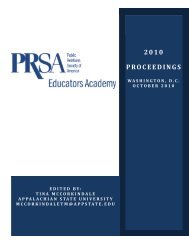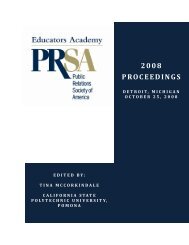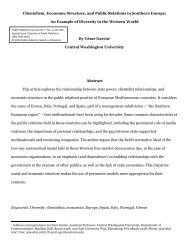2012 PROCEEDINGS - Public Relations Society of America
2012 PROCEEDINGS - Public Relations Society of America
2012 PROCEEDINGS - Public Relations Society of America
You also want an ePaper? Increase the reach of your titles
YUMPU automatically turns print PDFs into web optimized ePapers that Google loves.
Theme 6: Concerns<br />
Thirteen articles, or 7% <strong>of</strong> the dataset, were categorized as relaying some type <strong>of</strong> concern<br />
about the use <strong>of</strong> new communication technologies in public relations. Three sub-themes<br />
emerged: legal (5 articles), risk (5 articles), and ethics (3 articles).<br />
Legal<br />
Hallahan (2004) identified ―five major culprits‖ (p. 255) that posed legal problems to<br />
organizations via the Internet: ―attackers, hackers, lurkers, rogues, and thieves‖ (p. 255). For<br />
each, he described legal ramifications and possible means <strong>of</strong> protection.<br />
Other articles discussed the role <strong>of</strong> the Internet in litigation public relations (Reber,<br />
Gower, & Robinson, 2006), the dangers <strong>of</strong> assuming business blogging is fully protected by the<br />
First Amendment (Terilli, Driscoll, & Stacks, 2008), commercial speech concerns related to<br />
CEO blogging (Terilli & Arnorsdottir, 2008), and cautions in responding to anonymous Internet<br />
speech (Terilli, Stacks, & Driscoll, 2010).<br />
Risk<br />
Using a cultural studies approach, Mickey (1998) took a critical look at the relationship<br />
between the technology industry and education. He warned: ―In the 1930s many argued that<br />
television would make for a more educated society but television became a vehicle to sell goods<br />
and services. The Internet is moving along the same path‖ (p. 335). Strobbe and Jacobs (2005)<br />
raised concerns about news becoming commodified through online press release services.<br />
In a BledCom keynote address, Hiebert (2005) suggested that new communication<br />
technologies could ―save democracy‖ (p. 1) but cautioned that ―the pathway ahead for public<br />
relations is strewn with landmines‖ (p. 1). Included in his landmines were privacy invasion,<br />
identity theft, information inequities, and cyberterrorism. He also acknowledged that new media<br />
could ―become tools <strong>of</strong> tyranny and suppression‖ (p. 8) but that ―what happens will ultimately<br />
depend on what we let happen, how vigilant we will be, how much we listen, and how much we<br />
participate in the world around us‖ (p. 8).<br />
Robards (2010) wrote about privacy concerns in his examination <strong>of</strong> how young<br />
Australians used social media. In their content analysis <strong>of</strong> PRSA‘s <strong>Public</strong> <strong>Relations</strong> Tactics, a<br />
publication widely distributed to college students, Taylor and Kent (2010) observed a blatant<br />
lack <strong>of</strong> discussion <strong>of</strong> the risks associated with using social media in public relations practice and<br />
called for a reconsideration <strong>of</strong> how the pr<strong>of</strong>ession is socializing students.<br />
Ethics<br />
In 1995, Judd wrote about the role <strong>of</strong> ethics in the information age: ―While we may view<br />
it as amoral, a means to an end, technological innovation unsettles old values and creates new<br />
views <strong>of</strong> the world. Practitioners face a challenge‖ (p. 36). He went on to suggest ways to<br />
establish credibility for organizations in the midst <strong>of</strong> technological change.<br />
Related articles revealed that nondisclosure harms relationship building in social media<br />
environments (Sweetser, 2010) and the importance <strong>of</strong> corporations not only discussing ethical<br />
parameters on websites, but also building relationships with publics beyond just shareholders<br />
(Bowen, 2010).<br />
58
















